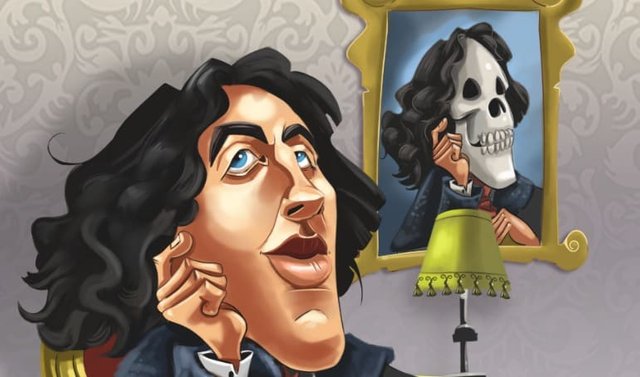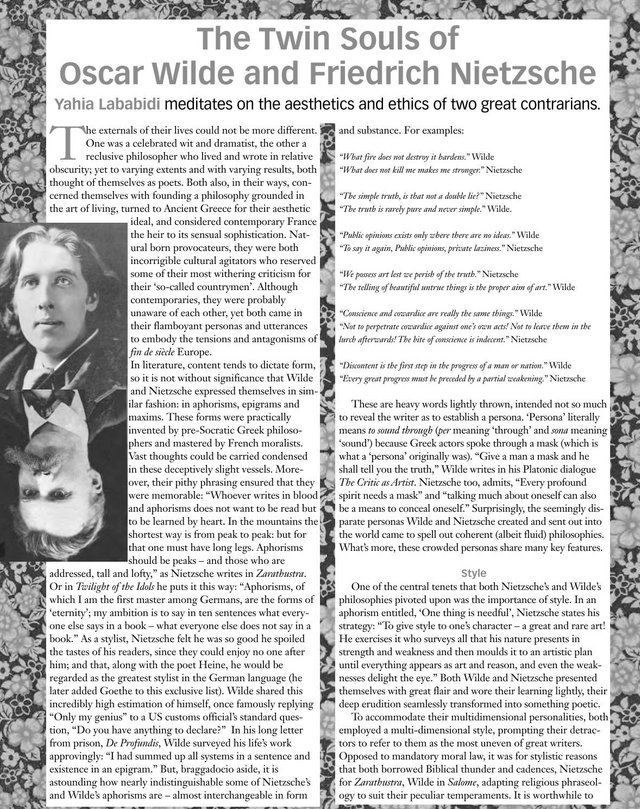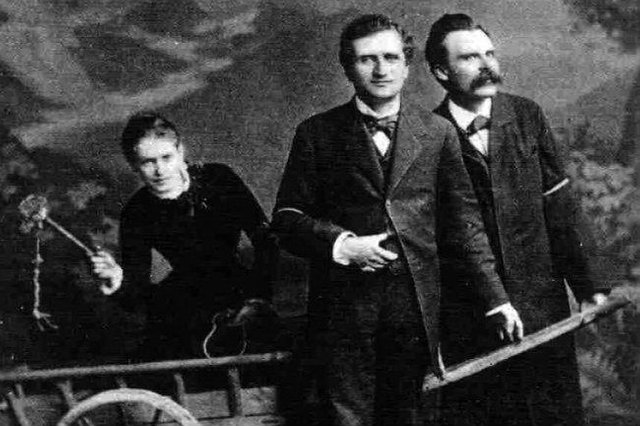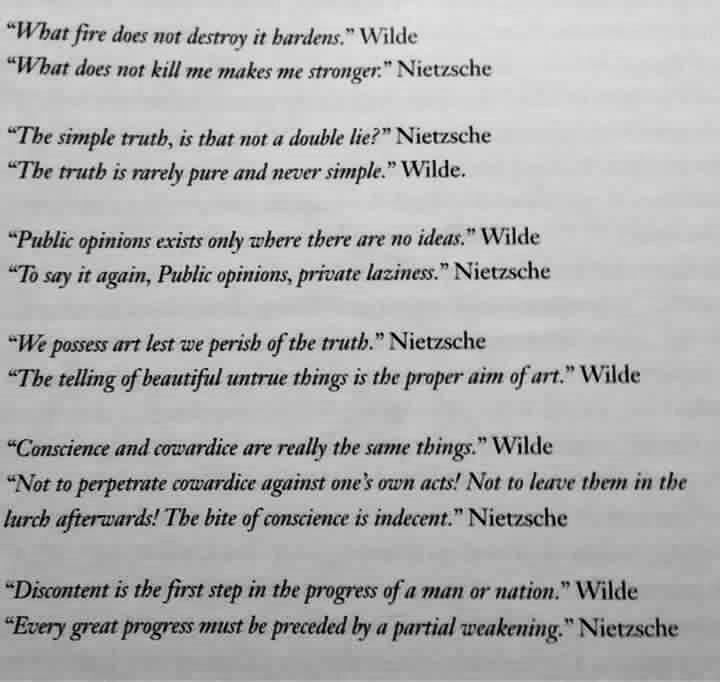The Philosopher as Clown & the Clown as Philosopher: Nietzsche & Oscar Wilde


As a continuation to the post I shared earlier, today, on The Importance of Play, I thought a few words about my early influences in literature and philosophy might be apt :) I was deeply drawn, as a voracious, questing teenager, to the work/worldview of Oscar Wilde and Friedrich Nietzsche. I realize, to some, these two might appear to be worlds apart but, for me, they were so close as to seem twin souls.
Nietzsche christened his approach Die Fröhliche Wissenschaft, which means ‘the joyful science’. It is a worldview in praise of light-heartedness or esprit (witty intelligence). Wilde shared in this playful philosophy which advocated exuberance, buoyancy and a sustaining sunny humor. (Neither was averse to a little playful malice, as well.) They both retained to a high degree the childlike faculties of wonder, joy, and belief in the impossible. This is evidenced in Wilde’s many improbable utterances and his delightful persona of boyish immaturity, as much as in his enchanting short stories for children.
The Argentine poet and author, Jorges Luis Borges, spoke of Wilde’s ‘invulnerable innocence’. Similarly, in Beyond Good and Evil, Nietzsche defines mature manhood as “that means to have rediscovered the seriousness one had as a child at play.” Along with their child-like innocence, Nietzsche and Wilde’s ‘philosophies’ also represented irreverence, mental/verbal play, and the license to poke fun.

“Not by wrath, but by laughter, do we slay. Come, let us slay the spirit of gravity” – thus spake Nietzsche’s Zarathustra. In a letter, Nietzsche put it still more mischievously: “I hang a little farcical tail on to the most serious things.” This is a sensibility amply echoed by Wilde: “Life is too important to be taken seriously” as he writes in Lady Windermere’s Fan. In the final equation, their answer to profound problems was a stylistic one: aesthetics over ethics. To achieve this, they often found it necessary to return to the surface of things.
Worlds of Appearances
Above all, Nietzsche and Wilde were great lovers of life, anachronistic Greeks in their adoration of the sun as life-force and their heady vitalist philosophies sensually imbued with a this-worldly spirituality. Likewise, in their deep belief in the wisdom of the body they echoed the Ancient Greek ideal of the dependence of a healthy mind on a healthy body:
“Oh, those Greeks! They knew how to live. What is required for that is to stop courageously at the surface, the fold, the skin, to adore appearances, to believe in forms, tones, words, in the whole Olympus of appearance. Those Greeks were superficial – out of profundity.”
This is not Wilde waxing poetic, but Nietzsche waxing philosophic. Of course, this is also the very same aesthetic philosophy Wilde championed: “It is only shallow people who do not judge by appearances” (Picture of Dorian Gray). Moreover, refinement and taste were prized: “All of life is a dispute over taste and tasting,” Nietzsche has Zarathustra say. Such an aestheticism was not only an interpretation of life, but a philosophy for life.

Nietzsche and Wilde may have also been superficial out of profundity in yet another way, if we allow that their preference for appearances may have been informed by Kant’s skepticism propounded in his Critique of Pure Reason (1781). According to this doctrine, we never know things as they are, but only as they appear to be. In this context, their resolve to stop courageously at the surface might not seem so unwise.
On another level, according to Alexander Nehamas’ study of Nietzsche, Life as Literature, Nietzsche’s aestheticism entailed a tendency for him to view the world in general as a work of art, and as a literary text in particular, populated by literary characters, including himself. Reading and writing were Nietzsche’s substitutes for living and loving, and he lived for and through the written word, as well as learned from and argued with books. Nehamas writes, “his use of and emphasis on style is itself part of his effort to undermine the distinction between form and content in life as well as writing.”
Merging life with literature was second nature to Wilde too, who openly admitted to performing his life. He felt life imitated art far more than vice versa, and said to Andre Gide, “My life is like a work of art.” And although as a wit about town he certainly got out more than the reclusive Nietzsche, he confessed in De Profundis: “I treated art as the supreme reality and life as a mere mode of fiction.” Or, as he has Gilbert argue in The Critic as Artist, “When a man acts, he is a puppet. When he describes, he is a poet.” There is much of Nietzsche within this verbal universe, affirming the supremacy of language, reclaiming power from fate through eloquent and articulate expression.
In Nietzsche we have the philosopher as performance artist, communicating in jokes, riddles, parables, poems, songs or aphorisms. In Wilde, it is the artist as performing philosopher, having made “art a philosophy and philosophy an art” as he wrote in De Profundis. Or, in the uncharacteristically lavish praise of the usually cantankerous George Bernard Shaw:
In a certain sense Mr Wilde is to me our only thorough playwright. He plays with everything: with wit, with philosophy, with drama, with actors and audience, with the whole theatre” (reviewing Wilde’s An Ideal Husband in the Saturday Review, January 12, 1895).
Following Wilde’s death, his friend Max Beerbohm wrote: “He came as a thinker, a weaver of ideas… Theatrical construction, a sense of theatrical effects, were his by instinct” (Saturday Review, December 8, 1900).
It is remarkable, given how alike they are in style and philosophy, that the two contrarians (who were contemporaries, born a day apart and passed the same year, 1900) never met or even read one another! You can see for yourself their striking similarity in some of their quotes I gathered, below, where it is difficult to determine which of them is speaking:

©Yahia Lababidi

(Images: 1, 2)
Wonderful thesis development.
I am struck with the expression ... on any given day. And how one's philosophy if not lived and adopted into practice is but an opinion. Most people do not act in accordance with their opinions but expect others to do so. My understanding from both writer's history is that they fell hard into suffering later into life and became ... if this makes sense ... victims of their own opinions. The snafu of a philosopher that can lead to hyper judgement. But then perhaps, it just the way history reports things.
If I had to choose ... I would choose Wilde. In many ways, he was a victim of his time and expectations on masculinity and he was ever so witty. I just would have loved to have sat with him. Nietzsche had that horrible 'uber man' philosophy and I cannot help but associate this with him more than anything else.
Wilde seemed to be onto the very opposite take with this quote ...
When a man acts, he is a puppet. When he describes, he is a poet
I like that very much:)
So much more to say about those 2, I hardly know where to begin. But, you are right to suggest that it ended badly for both, as they became "victims of their own opinions."
Wilde, of course, could be a lot of fun, which is why Churchill (another wit) admired him. Then, again, Wilde had a strong self-destructive streak, and his philosophy, devolved into a coarse praise of hedonism, cruelty, wickedness.
There's nothing "horrible" about the Uberman. Properly understood, it was a spiritual term, and referred to transcendence ('Man is something that must be overcome') . But the way it was distorted by his sister, who sold it to Hitler, while Nietzsche was insane and in her care, that is horrible.
There is far more I could say about those difficult two contrarians, the heroes of my youth, that I chose to leave out, so as not to dampen the fun. But, suffice to say, I don't turn to them, now.
Thanks, for hearing me out, Pryde, and sweet dreams
_/|\_That is very interesting to consider uberman to be a spiritual term. I may have to do more research. Have a good night:)
The best way to resist temptation, Wilde said, is to yield to it. I'm not sure but i think Neitszche mentioned something similar.
Brilliant piece, bro. I've never really considered any similarity between these two, but the way you brought it together here makes it all too apparent. Though the difference still lies in the fact that Wilde can never--and never meant to be--taken serious, while Neitszche, even when he's being humorous, can never be not taken seriously.
Thank you, for your appreciation; I'm glad you enjoyed this piece. Yes, in praising the Dionysian and living dangerously, Nietzsche, too, could be amoral, or immoral (suggesting that we yield to temptation).
I do beg to, politely, differ with your assessment. Wilde was, and meant to be, taken seriously as a thinker (in essays, Platonic dialogues, and even his paradoxical aphorisms). It's dismissive to think otherwise. Further, Nietzsche is, often, not taken seriously by the philosophy community for being unsystematic, whimsical and full of contradictions :) So, their legacies are somewhat more complex that you portray.
Damn I must have been getting the wrong vibes all these while. Lol. But I have noticed that mixed opinions about legacies are very rampant in the literary community.
I guess I should have said I find it hard to take Wilde seriously. He was being sarcastic when he called The importance of being Earnest "A trivial comedy for serious people", wasn't he? Cos it is not a trivial comedy and it is definitely not for serious people. I dont think he himself liked serious people very much.
And at least if it was really for them then I supposed it was to get them to be a little less serious. But ya, on the whole as an aesthetic and a philosopher he definitely deserves to be taken seriously.
Such a shocker about Neitszche. I used to get the vibe that everyone talked about him in awe. But then again I really know too little about Nietzsche than I wish I did.
Cheers man.
Thank you, for the qualification and good to see your own serious reading list (as well as your longing for the wisdom of humor). In my view, it does not detract from a serious work's gravitas, but only adds to it, if used intelligently.
Regarding, Nietzsche, as a German satirist once quipped: “Tell me what you need, and I’ll supply you with the right Nietzsche quotation.” And, in fact, with his ability to lend himself to innumerable interpretations, Nietzsche especially has been claimed by almost everyone: Anarchists, Atheists, Christians, Fascists, Liberals, Postmodernists, Deconstructionists, Existentialists, Rationalists, Irrationalists, Positivists and Nihilists.
Undoubtedly, we do not find Wilde or Nietzsche as outrageous as they were to their 19th
century sensibility. Rather, in our age, skeptical of absolutes and susceptible to pluralism of interpretations, we consider them contemporaries, or modern diagnosticians whose experiments with values mirror our own. Even in their contradictory works we recognize, writ large, the remarkable and complex workings of the human psyche.
Be well, brother, and wishing you more happy literary discoveries, as you deepen your knowledge of the classics.
Wow, I don't think I ever would have realized how alike yet so different these two were. I have learnt something new today. Thank you for that.
You're welcome and, thanks, for your attentions.
Wow, what a great comparison post my friend . These are two great minds I can say born and brought up differently but have so similarities. The serious and the unserious . The serious becoming the unserious and the unserious becoming the serious in comparison. What a beautiful exposure from you my friend , I look forward to learning new things as always following your blog
Thanks for sharing such an historical events on some great philosopher, it makes me remember the author of this drama oedipus Rex by Sophocles. And the great Aristotle who brought about the three unities of time in play.
My favorite quote

Image source